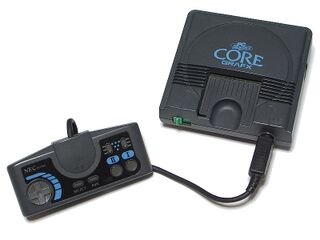Difference between revisions of "PC Engine CoreGrafx"
From NEC Retro
m (Text replacement - "{{clear}} {{PCEngine}}" to "==References== <references/> {{PCEngine}}") |
|||
| (3 intermediate revisions by the same user not shown) | |||
| Line 27: | Line 27: | ||
| square=yes | | square=yes | ||
}} | }} | ||
| − | + | ==References== | |
| + | <references/> | ||
| + | |||
{{PCEngine}} | {{PCEngine}} | ||
Revision as of 12:22, 6 January 2022

| |||||||||||||||
| PC Engine CoreGrafx | |||||||||||||||
|---|---|---|---|---|---|---|---|---|---|---|---|---|---|---|---|
| Manufacturer: NEC | |||||||||||||||
|
This short article is in need of work. You can help NEC Retro by adding to it.
The PC Engine CoreGrafx (PCエンジンコアグラフィックス) is an update to the PC Engine console, initially released in Japan in late 1989.
The CoreGrafx was announced around the same period as the PC Engine SuperGrafx, adopting a similar colour scheme, but otherwise being largely identical to a regular PC Engine. The CoreGrafx replaces the PC Engine's RF output with a composite A/V connector, but remains the same size and shape to allow it to interface with the CD-ROM² and other attachments which require the PC Engine's rear expansion port. The shell is not identical to the console's first iteration, but aside from aesthetics, the changes are negligible.
The console also shipped with a PI-PD06 controller - a CoreGrafx flavoured version of the PI-PD002, replacing the standard PI-PD001 controllers of the original PC Engine.
The CoreGrafx became the de facto model of PC Engine until the release of the CoreGrafx II in June 1991.
Physical scans
References
| PC Engine |
|---|
| PC Engine (1987) | CoreGrafx (1989) | CoreGrafx II (1991) X1 Twin (1987) | PC-KD863G (1988) | Shuttle (1989) | GT (1990) | LT (1991) |
| Add-Ons |
| AV Booster (1988) | Interface Unit (1988) | Ten no Koe 2 (1989) | Backup Booster (1989) | Backup Booster II (1989) | Ten no Koe Bank (1991) | Memory Base 128 (1993) |
